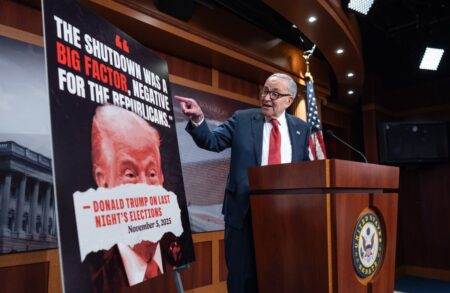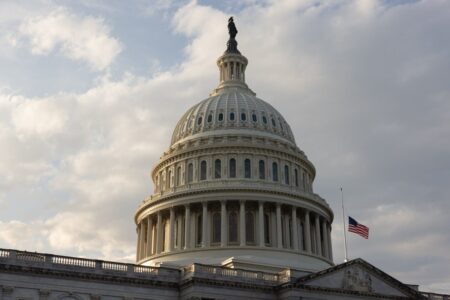Last week’s Supreme Court procedural ruling concerning the Supplemental Nutrition Assistance Program (SNAP) has drawn attention after legal analyst Shan Wu described the decision to temporarily pause a lower-court order to provide the benefits program with full funding as President Donald Trump being “outsmarted” by Justice Ketanji Brown Jackson.
Newsweek contacted Shan Wu and the DOJ for comment via email outside of normal office hours on Monday.
Why It Matters
The case centers on whether the Trump administration can legally withhold billions in available emergency funds from SNAP, or whether federal courts can compel it to fully fund the food benefits during a government shutdown.
While Jackson’s temporary stay appeared to favor the administration, legal analysts say it may have been a strategic move to prevent the court’s conservative majority from intervening prematurely and delaying food assistance for millions.
What To Know
A High-Stakes Fight Over Food Aid—Jackson’s Strategic Move
Wu said Trump was “outsmarted” because Jackson’s temporary stay, though it appeared to favor the federal government, was likely a strategic procedural move designed to prevent the Supreme Court’s conservative majority from issuing a broader, indefinite stay that could have delayed SNAP funding for months.
In other words, by narrowly framing her order and setting a 48-hour limit tied to the appeals court’s timeline, Jackson kept control of the process and forced a quicker resolution.
Wu, a former federal prosecutor and frequent CNN legal commentator, analyzed the issue in a YouTube video titled “Donald Trump ‘Outsmarted’ Over SNAP Benefits Ruling” published on November 9, 2025.
He has been a frequent critic of former President Trump and his administration’s approach to executive power.
At issue is whether the Trump administration can continue withholding certain federal funds from the SNAP program, which provides food assistance to more than 40 million Americans.
A federal district court had ordered the White House to fully fund November’s SNAP payments using $4 billion from the Section 32 fund, a contingency reserve.
That order was later appealed by the administration.
According to Wu, the government “fought tooth and nail to avoid using funds it has to fully fund the program during this emergency,” an approach he called “inexplicable.”
Jackson, who oversees emergency matters arising from the First Circuit, issued an “administrative stay”—a temporary pause allowing time for further consideration—rather than a stay pending appeal, which would have halted implementation for a longer period.
Wu cited law professor Steve Vladeck to clarify the procedural nuance. “It’s sort of like a quickie stay so that we have time to consider whether we should have a longer stay,” Wu said, summarizing the distinction between the two forms of judicial pause.
The White House Solicitor General, John Sauer, argued that fully funding SNAP from the Section 32 account would cause “irreparable harm,” claiming it could jeopardize other programs.
Wu disputed that, saying “the math is wrong” and that “there’s plenty to fund all the programs, or at least these two programs.”
The First Circuit Court of Appeals had earlier refused the administration’s request for a stay, noting in its order that the government “has not disputed that it may, under 7 U.S.C. 2257, use the Section 32 fund to cover the provision of SNAP benefits.”
The court described the government’s argument as insufficient, effectively leaving the district court’s order intact pending appeal.
Wu said Jackson’s action might have been designed to “head off having the full [Supreme] court jump in now and possibly setting very bad precedent.” He suggested that without her limited stay, “the conservative, MAGA majority of the Supreme Court…could have stepped in [and] granted their own stay, which could have been open-ended.”
By imposing a narrowly tailored, time-bound order, Wu argued, “She basically put pressure on everybody, on the First Circuit, as well as ultimately her colleagues, to quickly get the matter resolved,” he said.
Wu emphasized that his analysis was speculative: “I can’t be in her head,” he acknowledged, but maintained that Jackson’s decision “may be exactly what she was up to here.”
What People Are Saying
Former federal prosecutor Shan Wu said: “There would be no legal issue if they [the government] just did the right thing.” Forecasting what he believes will happen next Wu added: “The conservative majority of the Supreme Court will likely not be able to help themselves from wading into it.”
What Happens Next
The First Circuit Court of Appeals will decide whether to extend or lift Jackson’s temporary stay on the lower court’s order requiring the Trump administration to fully fund SNAP benefits.
That ruling will likely determine whether federal food assistance continues uninterrupted or faces delays for millions of recipients. Whichever side loses is expected to appeal to the Supreme Court, potentially setting a precedent on the limits of executive power over congressionally approved spending.
Jackson’s narrowly tailored stay has expedited the process, but the full court could still intervene, meaning the legal and political fight over SNAP funding—and its human consequences—is far from over.
Read the full article here














